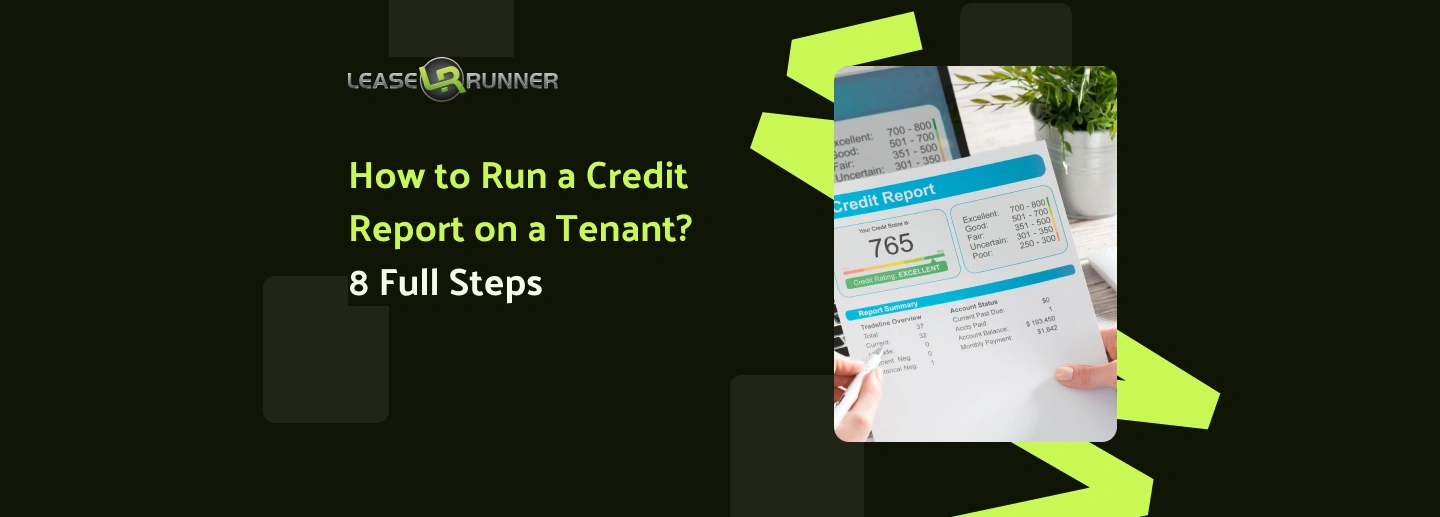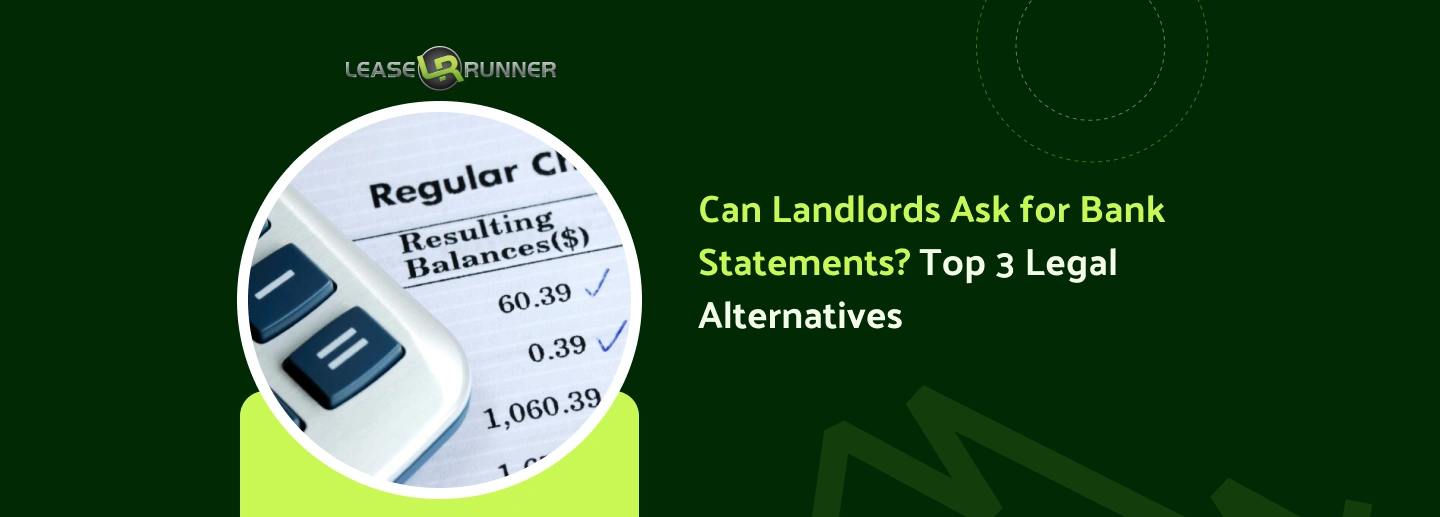One of the most crucial stages in your application to rent a house or apartment is the credit check. However, you might wonder, what do landlords look for in a credit check? Credit checks let landlords find out if you are likely to pay rent on time and be financially responsible. Knowing this will help you polish your application and raise your chances of acceptance.
As more people are renting, landlords mostly depend on credit checks to lower their risk. This article defines a rental credit check, why landlords do it, what they search for in your credit report, and how you could pass one. We also discuss the differences between soft and hard credit checks and how LeaseRunner's systems enable landlords to fairly and rapidly perform tenant screening.

Quick Facts About Things Landlords Look For In a Credit Check
What Is a Rental Credit Check?
A rental credit check is an essential tool for landlords to assess a prospective tenant's financial responsibility, creditworthiness, and reliability, as well as confirm their identity through a process called identity verification. It provides a detailed report on your financial background, including your credit score, payment history, debt, and public records like bankruptcies or past evictions.
Landlords use this information to determine if you are a low-risk tenant who will pay rent reliably and on time. One or more of the three main credit bureaus, Experian, Equifax, and TransUnion, produce the credit report. Every bureau may have somewhat different data, hence landlords occasionally review more than one report.
LeaseRunner credit checks in the tenant screening process offer comprehensive credit reports that feature the VantageScore 3.0, along with details on addresses, employment (if available), and any liens, bankruptcies, or judgments.

Why Do Landlords Use Credit Checks?
Rental credit checks or credit checks before a lease help landlords lower their chances of experiencing issues like unpaid rent or property damage. A high credit score generally indicates a history of wise money management and paying bills on time. Conversely, a low credit score may suggest missed payments, significant debt, or other financial difficulties.
This makes landlords concerned about a tenant's potential for irregular rent payments. Therefore, understanding what landlords look for in a credit check clarifies how they will view your application and how you can raise your chances of being approved.
Landlords use the tenant screening process to assess a prospective tenant's financial responsibility and creditworthiness. The landlord credit report analysis provides a comprehensive view of an applicant's financial behavior. Key credit report indicators a landlord will scrutinize include:
- Payment History: This is a crucial financial red flag for landlords. Landlords want to see a history of on-time payments. A history of late or missed payments on credit cards, car loans, or other debts can raise concerns about a tenant’s ability to pay rent consistently.
- Outstanding Debt: A high debt-to-income ratio (DTI), which indicates a tenant’s monthly debt payments are high compared to their income, can be a major red flag. Landlords may be concerned that a tenant with too much debt won't have enough money left over to pay rent. If needed, learn more about how to verify tenant income here.
- Public Records: Public records such as bankruptcies, evictions, tax liens, foreclosures, or civil judgments are significant indicators of past financial instability and are heavily weighted in a rental application credit review. A prior eviction is a serious red flag, as it shows a history of not fulfilling a rental agreement.
- Accounts in Collections: Collections or defaults show that a person has not paid off their debt, and the account has been turned over to a collections agency. This can show a lack of commitment to financial obligations.
Understanding the key landlord credit check criteria is essential for any renter. To improve your odds, it’s smart to check your own credit report for errors, pay down existing debt, and address any accounts in collections before applying. Knowing what credit score is needed to rent an apartment is another way to set your expectations correctly.
By addressing these issues beforehand, you can present yourself as a reliable, financially stable applicant. For more tips on how to pass a rental credit check, check out our detailed guide. Landlords often use professional services for a thorough tenant financial screening criteria check.
What Do Landlords Look for in a Credit Check?
As part of the tenant screening process, a credit check is an essential tool for landlords. It helps them predict a prospective tenant's financial responsibility and reliability. For landlords, understanding a tenant’s creditworthiness helps them minimize risk and protect their investment.
For tenants, knowing the landlord's credit check criteria helps them prepare their application and present themselves in the best possible light. A credit report provides a detailed view of a person’s financial history, revealing far more than just a single number. Landlords use this information to determine if an applicant can handle the financial commitment of a lease and make timely rent payments.

Credit Score
The first thing landlords look at is your credit score. This number, a product of your financial history, serves as a quick snapshot of your credit risk. Many landlords set a minimum credit score requirement for renting, often in the range of 600-620. As your score increases, so do your chances of being approved.
Scores above 700 are generally considered good credit scores and can make an application stand out. However, remember that the credit score is just one part of the equation, as landlords use a more holistic landlord credit report analysis for a final decision.
This analysis often considers the full range of credit scores, from poor to excellent, to determine a renter's eligibility, and they may also look at a specific credit score type, like FICO or VantageScore, to standardize their evaluations.
Payment History
Landlords will closely scrutinize your payment history for evidence of consistent payments. This is one of the most significant credit report indicators of a tenant’s future behavior. Red flags include late payments, defaults, or accounts in collections (for example, unpaid medical bills or credit card debt sent to a collection agency).
While one or two late payments may not be a deal breaker, a pattern of missed payments will almost certainly result in a rejected application. A history of consistent, on-time payments on past loans and credit cards shows a clear pattern of responsible financial behavior, which is exactly what a landlord wants to see.
Debt-to-Income Ratio
Debt-to-income, or DTI, is a crucial metric that compares your monthly debt load to your income. Landlords want to know that your income will be sufficient to pay your bills and your rent, and they may ask for bank statements to verify this.
After that, they will use this to confirm that your income will be sufficient to cover both your existing financial obligations and the rent. A DTI higher than 40% might signal financial strain and can be a reason for rejection.
For example, if you earn $4,000 per month and your total monthly debt payments (car loan, student loans, credit cards) amount to $1,800, your DTI would be 45% ($1,800 / $4,000), which may be considered high by many landlords. The DTI is a key component of the landlord's guide to tenant credit, as it directly relates to your ability to afford the rent.
Public Records (Bankruptcies and Judgments)
Public records on your credit report are among the most serious financial red flags for landlords. These are typically a result of severe financial distress and often lead to an application being denied.
- Evictions: A past eviction is a major concern as it indicates a previous failure to uphold a rental agreement.
- Bankruptcies: A bankruptcy shows a history of significant financial failure. While it may not automatically disqualify you, it will require a more thorough explanation and a strong case for your current stability.
- Civil Judgments: These are court-ordered debts that you have failed to pay. They show a clear history of not meeting financial obligations and are viewed very negatively.
- Tax Liens: Similar to civil judgments, these are government-issued claims against your property due to unpaid taxes, showing a clear history of not meeting financial obligations.
Credit utilization
Credit utilization refers to the amount of credit you are using compared to your total available credit. For example, if you have a credit card with a $10,000 limit and you have a balance of $8,000, your credit utilization is 80%. A high percentage can indicate that you rely heavily on credit, which may concern a landlord.
A low credit utilization ratio (typically below 30%) suggests good financial management and is seen as a positive sign. Managing this ratio is one of the effective tips on how to pass a rental credit check.
Length of Credit History
The length of your credit history shows how long you've been managing credit. Landlords see a longer history as a good thing because it provides a more comprehensive view of your financial habits.
If you have a short credit history, such as a recent college graduate with only a few months of credit card use, a landlord may not have enough information to make a confident decision. In such cases, having a co-signer or a strong rental history from a previous landlord can help make up for a limited credit history.
Credit Inquiries
Credit inquiries are records of when a lender or other entity has checked your credit report. They are divided into two types: soft and hard inquiries. A hard credit check, like the one a landlord performs as part of the landlord's credit report checklist, can slightly lower your credit score.
Many hard inquiries in a short period might signal to a landlord that you are in a difficult financial position and are desperately seeking new credit.
What Credit Score Do Landlords Typically Accept?
While there is no single rental credit score requirement that applies to all properties, most landlords have a preferred range. A good credit score is often considered to be above 670, and a tenant in this range is typically seen as a low-risk applicant.
Then, what is the minimum credit score a landlord should accept? A score between 620 and 669 is considered "fair" and may be acceptable, especially if the applicant has a strong rental history and stable income. A score below 620 is generally considered a higher risk, but it does not automatically disqualify you.
It's important to remember that the credit score is just one part of a landlord's credit evaluation process. Landlords also consider other factors, such as income verification, positive rental history, and a low debt-to-income ratio.
For instance, an applicant with a lower score but a stable job and a history of paying rent on time may be seen as a better bet than someone with a high score but a sporadic work history.
If your score is on the lower side, you should be prepared to provide additional information, such as proof of income and credit references, on your rental application. Sometimes, providing a credit report for renters from a reputable source can also help you show your financial standing clearly. You can also strengthen your application by including what credit references are on the rental application. This provides landlords with an even more comprehensive picture of your financial background.
6 Tips on How to Pass a Credit Check for Renting

Your credit score doesn't just affect approval; it also impacts rental terms. But if you're prepared, you can easily navigate the process. The following suggestions will help you understand how to pass a rental credit check and increase your chances of getting approved.
- Review Your Credit Report and Fix Errors: Get your credit reports from Experian, Equifax, and TransUnion. Check them for mistakes like wrong addresses or accounts you don't own. Fixing these errors can quickly raise your score. Do this early, as credit checks often happen fast.
- Boost Your Credit Score Before Applying: A great way to improve your credit is to pay down debt. Focus on lowering credit card balances. This shows landlords you handle your money well and have a low debt-to-income ratio.
- Prepare Proof of Stable Income: Landlords need to see that you can pay rent. Get documents like recent pay stubs or a letter from your job. Having this proof ready shows you have a steady income.
- Offer Extra Guarantees to Landlords: If your credit score is low, you can offer a larger security deposit. This extra money makes landlords feel more secure and willing to rent to you.
- Use a Co-Signer or Strong References: A co-signer with good credit can promise to pay your rent if you can't. This lowers the landlord's risk. Also, good references from past landlords can show you are a reliable tenant.
- Be Honest About Negative Items on Your Report: If your report shows past issues like bankruptcy, be upfront. Write a short note to explain what happened, like a job loss or medical costs. This shows you are honest and responsible.
Best Practices in Credit Checks for Landlords
For landlords, implementing a solid tenant screening process is essential for making informed decisions. The credit report is only one part of the equation, but it’s a critical one. Here are some best practices for landlords when evaluating a credit report for rental applications:
- Be consistent: Apply the same landlord credit check criteria to all applicants to avoid accusations of discrimination. For example, if you require a minimum credit score of 620, apply that standard to every applicant.
- Review the full report, not just the score: The credit score is a good starting point, but a thorough landlord credit report analysis involves looking at the entire report. A high score with a recent eviction on the record should be a red flag, while a low score with a brief history and no negative marks may be acceptable.
- Verify the applicant’s identity: Ensure that the credit report belongs to the person applying. This helps prevent fraud.
- Look for patterns, not isolated incidents: A single late payment from five years ago is not as concerning as a series of recent missed payments. Focus on recent behavior to predict future reliability.
- Communicate your criteria: Make your rental credit score requirements clear in your listing or on the application. This saves time for both you and the applicant.
How to Decide Beyond Credit Score?
Credit scores are powerful, but they don't provide the complete picture of a tenant's creditworthiness. Here is a quick look at other factors to consider during the rental application credit review:
- Rental History: Contacting past landlords to verify on-time rent payments and a history of good tenancy is crucial. A strong rental history can often compensate for a less-than-perfect credit score.
- Income and Employment Stability: A tenant with a stable job and an income-to-rent ratio of 3:1 or higher is a strong candidate, regardless of their credit score. Ask for pay stubs, employment verification letters, and tax returns as part of a detailed landlord's guide to tenant credit.
- Personal References: Personal references can provide insight into an applicant’s character and reliability.
- Identity Verification: Verifying the applicant’s identity is crucial to avoid rental scams and fraudulent applications. You can learn more about how to spot a rental scam right here to protect yourself.
- The Applicant's Communication: How an applicant communicates with you throughout the process can be a good indicator of their potential as a tenant. Are they responsive? Do they provide all the requested documents? By considering all of these key factors in landlord credit checks, you can make a more informed decision and find a reliable, long-term tenant.
Wrap Up
So, what do landlords look for in a credit check? They want to see a good credit score, a clean payment history, a reasonable debt-to-income ratio, and no serious public records like evictions or bankruptcies. Knowing this can help you pass a rental credit check more likely and help you prepare better.
To streamline the process, use LeaseRunner’s full suite of tenant screening reports. Early on, check your credit; correct mistakes, lower debt, and provide income verification. These actions will allow you to find your future house with ease.
FAQs
Q1. Do private landlords do credit checks?
Indeed, although not always, many private landlords do credit checks. Others depend on referrals or firsthand interviews. To lower risk, nevertheless, credit checks are becoming increasingly routine among private landlords.
Q2. What is the relation between credit score and apartment renting?
When renting an apartment, your credit score plays a big role. Apartments often have minimum credit score requirements. If your score is low, you may need to provide extra documentation or a co-signer.
Q3. How to improve your credit score before renting?
Raising your credit score before you apply can boost your chances. Keep old accounts open, pay payments on time, cut debt, and steer clear of new credit searches.
Q4. What happens if you fail a rental credit check?
If you fail, landlords might turn down your application. You may attempt to correct problems and get comments. Sometimes, giving a bigger co-signer or deposit helps.
Q5. What credit score ranges do landlords prefer?
Most landlords desire renters with credit scores higher than 600. Good and often approved scores are between 670 and 739. Very excellent scores above 740 help to simplify the approval process. If your score is poor, landlords might demand a co-signer or a larger deposit.







